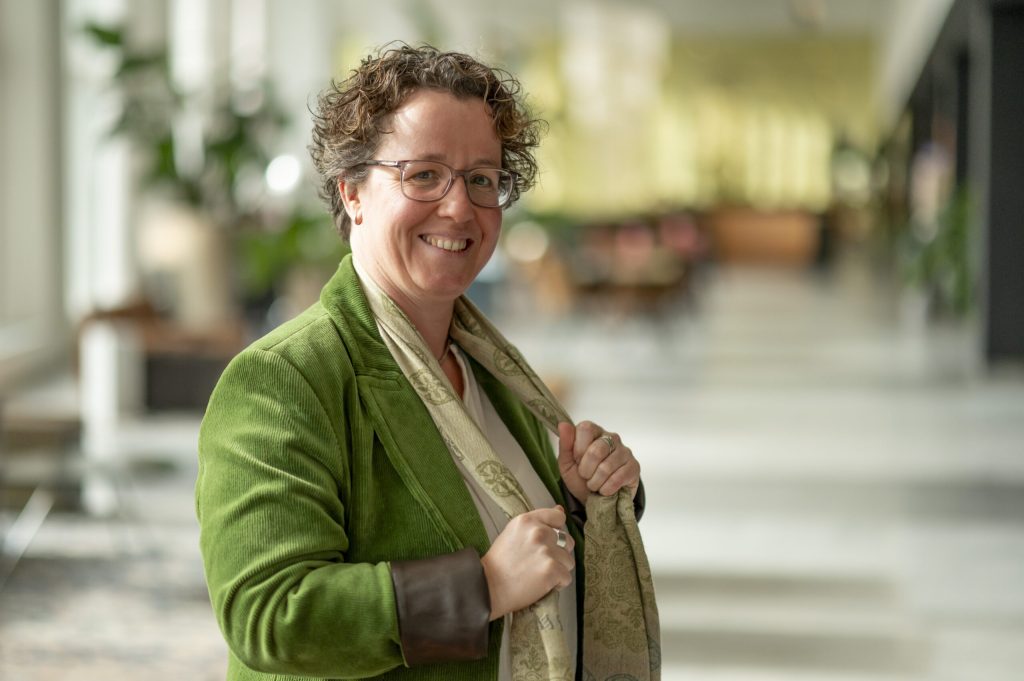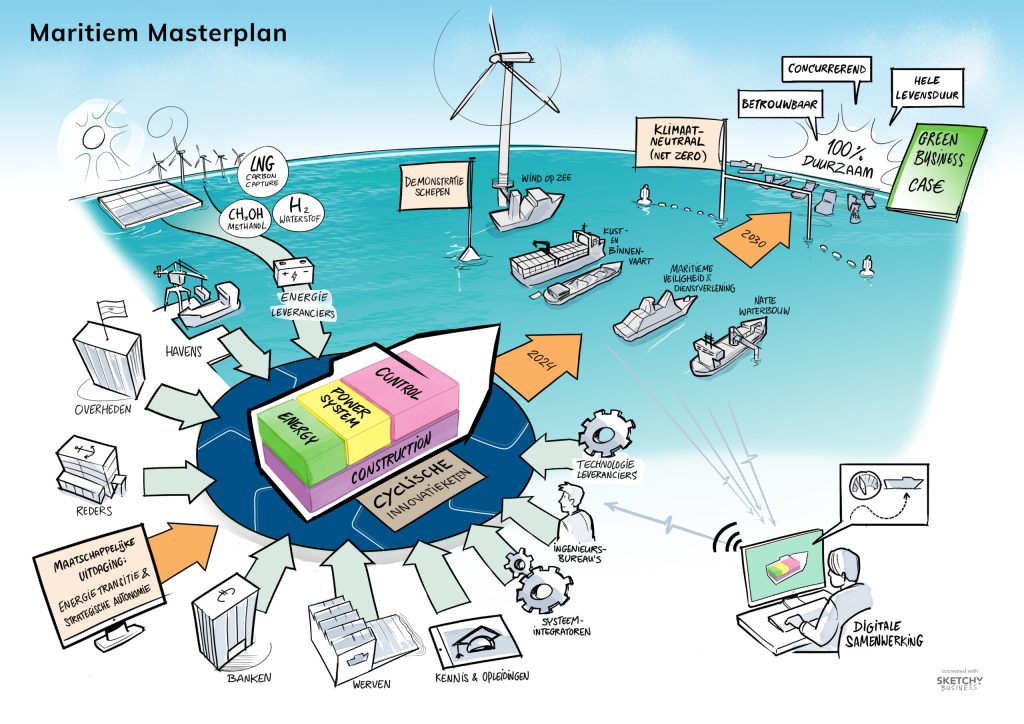The maritime sector is on the eve of a digital revolution, and at the helm of this transformation is Mariël van der Linden, programme manager of Digital Collaboration - JMDP for the Maritime Masterplan. Her extensive background in IT and telecom for international organisations combined with an impressive track record in cross-organisation collaboration make Mariël the perfect quartermaster for digital collaboration in the maritime sector.
Mariël's career began in the IT sector, but she found her true vocation in organisational behaviour and change management. “Following my IT career, I took my first steps in a new direction, that of organisational behaviour and change management. I focused on cross-organisation collaboration. I can now make the best use of this combination of competencies for the digital collaborations and the Joint Maritime Digital Platform (JMDP) within the Maritime Masterplan," she tells us enthusiastically.
The JMDP and the Maritime Masterplan focus on, among other things, the promotion of digital collaboration in the sector. "In our case, we're talking about digital collaboration in the sense of parties exchanging information digitally in a collaborative chain," Mariël explains. "We are trying to make an effective contribution, with innovations, to the implementation of the Maritime Masterplan as a whole. That makes some demands on the organisations themselves. That's why there's an important change management aspect to this plan."

Implementing digital collaboration in the maritime sector is no easy task. “The complexity is in the new forms of collaboration and the impact they have on each organisation," says Mariël. “In this sector, it's largely about standardisation. How do we reach standards that make our collaboration even better, smarter and easier?
How do we make it simpler to collaborate and come up with faster, better and cyclic innovation? How can we reuse knowledge and data to speed up innovation and improve processes?”
In her career, Mariël has supervised various cross-organisation collaborations, such as the initiation of the Port Call Optimisation Task Force. “That collaboration started in the Port of Rotterdam, to optimise the Port Call process. It has now expanded into an international collaborative partnership,” she explains. "Our initial idea was that new technologies in the port process could lead to improvements. But at a certain point, we realised that by looking at the information needs in the chain from a different angle, we could achieve much better process optimisation. That led to standardisations that are now applied in other ports too."
Although Mariël personally doesn't like to sail - "I get really seasick!" - she has a fascination for the maritime industry. It's a dynamic sector with a 'what you see is what you get' mentality. I feel at home there.”
The hands-on mentality of the maritime sector can sometimes be a challenge when creating a long-term vision and plan of action. "New digital collaboration has an effect, not only on the organisation itself, but on whole chains within the collaboration. It's true that if you don't know something very well, it can be unsettling to fiddle about with certain things without knowing exactly what the effect will be. But in ten years, with the following generation of workers, we'll be completely used to it," says Mariël.
Mariël is seeing much support for the Maritime Masterplan. “i see that many parties are endorsing the plan. Digitalisation and collaboration offer advantages for the entire sector. At the same time there are parties who have questions about sharing data and intellectual property, for example. But we're also seeing organisations that can't wait for that digital collaboration," she tells us.
Another interesting development is the growing commitment among suppliers to digital services in the maritime sector. “Those suppliers are going to continue to organise themselves, searching for ways to further shape the digital collaboration. We've thrown a pebble into the pond and the ripple effect is visible," Mariël tells us.
She is already seeing some very nice collaboration projects occurring. “For example, a number of companies are now in talks about a proof of concept with regard to digital collaboration, discussing questions such as: if we are able connect our services as a digital chain, what will that look like? Those parties haven't yet tried this, but they believe they can do it.”

The developments at 2BA, such as a uniform objects library and digital twins, offer many possibilities. "For me, the OMDS initiative is a great example of successful standardisation, and I hope that it will give the sector a boost in taking the next steps towards standardisation and digitalisation. It will help the sector going into the future. Innovating is a cyclic process that never stops, and that process is hugely reinforced and accelerated by digital collaboration between chain partners," says Mariël.
She sees opporunities for OMDS. “When continuing to standardise in the maritime sector, we could also include standards from the installation sector. Within Digital Collaboration - JMDP, we have subsidies available for initiating the next step in digital collaboration and sector-wide standardisation, and OMDS can play a role in that too.”
Mariël's vision for the future is optimistic. "The digital and physical worlds will become closer to each other and start to merge, which will allow us to design, build and operate ships faster, cheaper and more safely. I'm thinking of subsequent steps in digitalisation and automation in shipbuilding, new ways of three-dimensional designing with information from various parties. Which will then lead to, for example, augmented reality applications for crew and installers on a ship and new applications, maybe with AI."
The transition to sustainable ships is a major goal of the Maritime Masterplan. “The need for achieving faster cyclic innovation is greater, precisely because of these new drive lines. You can innovate faster and qualitatively better through digital collaboration," Mariël explains.
According to her, the greatest challenge is not getting everyone on the same page, but linking the various elements in digital collaboration. “The growth paths are important in this, the steps to be taken can't be too big. I want everyone to be able to get to work on it, regardless of the current level of digitalisation."
Mariël hopes to be able to demonstrate the first proof of concepts in a year's time. “We first want to have clarity about the use cases of the demonstration consortium we are going to be working with. That will form the basis for further development in the years after that."
Lastly, Mariël emphasises that digital collaboration isn't really new for anyone. “It's not a big step. All parties are already doing it, but we can do it much better together. To that end, we're going to lay down a strong, sector-wide foundation that sectors will retain even after the Maritime Masterplan, And I really want to help with that," she concludes.
Thanks to her vision and drive, Mariël van der Linden is setting the course for a future in which the maritime sector makes optimum use of digital collaboration, with a maritime industry that's more efficient, sustainable and dynamic as the end goal.